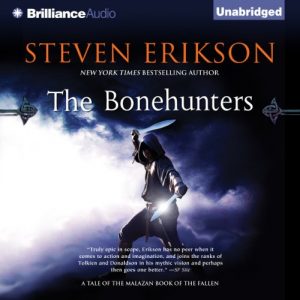 Jesus, I read The Bonehunters eleven years ago. No wonder I don’t remember things from these books. And then, helpfully, I didn’t say much about it, except for that I really like the book and the series. Facts which remain true, so that’s something.
Jesus, I read The Bonehunters eleven years ago. No wonder I don’t remember things from these books. And then, helpfully, I didn’t say much about it, except for that I really like the book and the series. Facts which remain true, so that’s something.
To be fair to past me, it has gotten functionally impossible to discuss these books without spoilers, though, you know? So, prior to the cut, I can say a few things here.
Thing one: I remain pretty happy with the narration. The original guy was probably better, but they fixed the pacing issues I hated so much, and the new guy learned how to pronounce things, so all in all, it’s gone well.
Thing two: I’m pleased that the timeline jumps are mostly over? Well, that’s an assumption, to be sure, but I think a true one. The first four books alternated between relevant simultaneous timelines (plus one random major flashback), then the fifth book is all flashback to before any other events, and this sixth book is dealing with the consequences of everything that has happened prior, setting up an explosive… man, I don’t know. I remember bits and pieces of the next book, but I know I liked it too, and then to be honest I’m not sure if I ever read the eighth one or not. I definitely forgot the really important climax of this book here, so who knows?
Thing three: no, that was all except for spoilers. So thing three is the cut.
Anyway. First, the siege of Y’Ghatan, which was not a proper siege in the first place and in the second place the fight, however cleverly accomplished, is not my point. My point is, the escape crawling through the thousands of years old historic bones of the city is my favorite extended scene of the series, excepting only the Chain of Dogs from the second book. I like caves and I like archaeology, but more than that, Erikson really makes you feel the moment. Well, and most moments in the series, so maybe it is more that I liked the subject matter after all?
Second, Icarium. I don’t have a lot here, but I guess my point is, if I actually believed he could successfully destroy Emperor Rhulad Sengar, I would have some hard thoughts at myself about whether maybe just this once the ends really do justify the means. But I have a bad feeling he can’t, and so I mostly dodge this concern.
Third, Malaz City. I liked that he riffed off some of the characters from Esslemont’s first book, but without making them critical to this story. It makes it feel like a shared world with a past and a present, instead of an end around trick to introduce new characters over halfway through the series.
Lastly, the Empress. I guess it’s Kalam’s fault, but I really believed that she had a plan and understood what was going on for a longer game, and our reasons for hating her in the early books were a big mislead. But then we get here and…. nope, she’s just a venal, power-mad idiot who can’t tell friend from foe and deserves the death she should have received, well, frankly, at an earlier point in the history of the empire than I have yet read, but definitely by the end of the second book.
On the bright side, she lucked into the Paran siblings. Well, no, she didn’t, but the Empire did. Oh, and one more thought while I’m here: obviously Whiskeyjack should have inherited the Imperial throne, but since he ended up a sergeant, I’m glad, structurally, that he died. If he had lived, you see, I don’t think we ever would have gotten Sergeant Fiddler, and I have not yet gotten me enough of that.
Pingback: Good Omens | Shards of Delirium